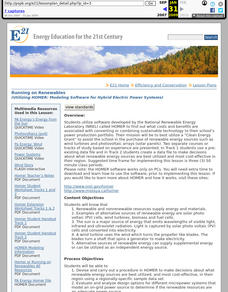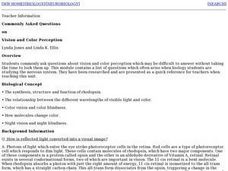Curated OER
Grating Spectrometer
Students calculate the Balmer series. In this physics lesson, students observe hydrogen lamp spectra using spectrometers. They calculate wavelength and compare them with their theoretical calculations.
Curated OER
All Those Seeing Color, Say Eye!
Students research and discuss the roles of the eye and brain in the perception of color. They watch a slideshow and complete a worksheet.
Curated OER
Overhead Spectroscopy
Students explore the relevance and importance of data collection and analysis techniques that use different parts of the electromagnetic spectrum. They observe the basic concepts of the visible electromagnetic spectrum and the...
Curated OER
Photosynthesis Lesson Plans
You can teach students about the importance of plants and the process of photosynthesis with motivating lesson plans. Follow along and find out how one science teacher uses experiments, stories, and her love of plants to get kids excited...
Curated OER
Water and Ice
Students explore water. In this water instructional activity, students explore the physical properties and states of water. They observe how water changes states and document what they see.
Colorado State University
Why Does it Get Colder on a Clear Night than a Cloudy Night?
Clouds are nature's insulator! A lab investigation asks learners to use an infrared thermometer to measure differences in infrared temperatures. They find that pointing the thermometer at a cloud has a much different result than pointing...
NASA
Tools to Study Tornadoes and Galaxies
Take your class on an intergalactic journey as they explore the galaxy and various meteorological events taking place in our atmosphere each day. Learners investigate electromagnetic waves and the Doppler Effect before gathering radar...
Curated OER
Photosynthesis
This relatively short PowerPoint contains all of the information necessary to give a clear summary of Photosynthesis. There are a few illustrations and clear descriptions of each stage of the main reactions.
Curated OER
Colors of Stars
Students observe the colors found in the flame of a burning candle and examine the basic concepts of matter and energy. Students apply this information to the color's of starts and the temperature of the stars photosphere. Students...
Curated OER
Climate And the Greenhouse Effect
Young scholars demonstrate the greenhouse effect. They recognize that relatively small changes to our environment can stimulate significant climate changes. They determine that the "scientific method" is a process of testing hypotheses...
Curated OER
Earth's Winds, Crust, and Atmosphere
This site provides a variety of activities and worksheets about the problem-based learning activity about Earth and its atmosphere. The lessons can be used separately or together in a geology unit. The resources and charts are very...
Curated OER
The Spectrum of a Star
Tenth graders identify stars based on their line spectra. In this astronomy lesson, 10th graders analyze spectrograph and determine the elements present in the star. They explain the relationship between temperature and star classes.
Curated OER
Running on Renewables
Students investigate the costs and benefits of switching their school to sustainable technology energy production. They use software called HOMER developed by the National Renewable Energy Lab to do the cost/ benefit analysis. They then...
University of Colorado
Using Spectral Data to Explore Saturn and Titan
Saturn's rings are made of dust, ice, and solid chunks of material. Individuals use spectrographs in this final installment of 22 lessons to determine the atmospheric elements. They analyze spectrums from Titan's atmosphere and...
Curated OER
Commonly Asked Questions on Vision and Color Perception
Students commonly ask question about vision and color perception which may be difficult to answer without taking. They use this module that contains a list of questions which often arise when biology students are studying the nervous...
Curated OER
Stellar Fingerprints: the Spectra of Stars
Students explain how an element can be identified using emission spectra. They relate the emission spectrum of hydrogen to its absorption spectrum and identify hydrogen absorption lines in the spectrum of stars.
Curated OER
Which Colored Filter Will Decode a Secret Message?
Students investigate how to create secrete messages through filters. They view pictures with red and green filters and discuss what they observe. They select the color filter that works best to read secret messages. They view pictures...
Curated OER
Electromagnetic Spectrum/Spectroscopy
Students examine the electromagnetic spectrum and demonstrate the elements within. For this investigative lesson students complete a demonstration and calculate the energy of a photon.
Curated OER
Fiber Optics
This is a printout of the slides for a presentation on fiber optics. In bullet-style notes, it covers how optic fibers work, their structure, different types, and their use. You may use these as a lecture guide, or if you want to take...
Curated OER
The Colors on My TV Screen
Students explore how electronic screens use only three colors to produce the colors that people see on the screen. They make and test a color wheel.
Curated OER
and and Ocean Views of Earth by Remote Sensing
Students explain how satellites help scientists to see more than with the unaided eye and how Landsat technology works. Students identify vegetation and fire sites in the rainforest and detect erosion along rivers. They are able to use...
Curated OER
Chloroplasts and Pigments
In this plant pigments worksheet, students compare the function of 3 types of pigments: chlorophylls, carotenoids, and phycobilins. This worksheet has 23 fill in the blank, 3 drawing, and 2 short answer questions.
Curated OER
Physics- global warming
Students discuss the concept of global warming and view a multimedia clip on the global warming phenomenon. They statistically analyze mean temperature data and compare a given set of data. Data on atmospheric CO2 is done then they...
Curated OER
Spectral Surprise
Learners experience a model that produces, separating, and displaying spectral colors.

























